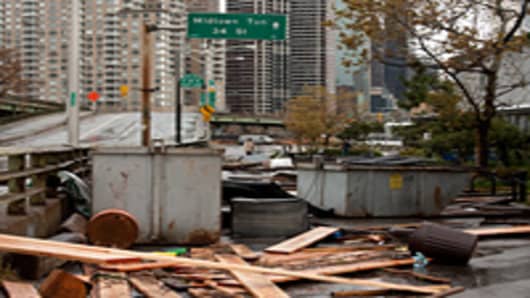After a years-long feud, the need for New York to rebuild after Hurricane Sandy may force banks and government leaders to put aside their differences, at least for the time being.
Banking analyst Dick Bove, long a critic of the how New York — both the state and city — treats the industry, thinks Sandy may provide an opportunity for reconciliation.
"They may have to put their hatreds aside and work with the industry by backing off their continued political attacks," the Rochdale Securities vice president said in an analysis. (Read More: Storm Recovery Could Take Weeks as Millions Struggle)
New York officials and regulators indeed have taken a stand against the Wall Street bankers whom they feel caused the financial crisis that exploded in 2008.
A series of regulatory measures as well as lawsuits and prosecutions against some of the Street's top names — most recently JPMorgan Chase — have deepened the chasm. Bove has speculated that New York is well on its way to losing its status as the financial capital of the world. (Read More: Banks Should Leave New York Due to 'Constant Hostility')
Yet the two sides may be well positioned now to bring the area back from the brink following the tragedy and destruction of Sandy, which stomped through New York Monday and Tuesday and decimated the city's infrastructure.
"The terrible part of Hurricane Sandy is past. Now the positive part of a hurricane begins," Bove said. "It includes rebuilding and, in the case of New York City, renewing."
Comparing this week's hurricane to two of its predecessors, Katrina and Andrew, Bove said both storms produced tremendous damage but also led to a spurt in economic activity from rebuilding.
Katrina saw New Orleans and the region spend up to $120 billion in rebuilding efforts, which he said was "investment that would never have been made at this magnitude if the disaster had not occurred." (Read More: $4 for a Can of Coke? Price Gouging Hits New Level)
Banks took part because they were able to use customer deposits from insurance settlements to make more loans.
Bove detects potential similarities to the Sandy aftermath.
"The steps noted in Katrina's wake will now take place in the mid-Atlantic to Northeastern states," he said. "Of particular interest is New York City. This metropolis is critical to the nation's finance system. Unfortunately, it is being discovered that the financial system now rests on the physical infrastructure of a 19th-century city."
More money will now be invested in New York — money that Bove said will have to come from the vilified banking system.
"This is a multi-year process that will entail spending tens of billions of dollars," he said. "This will inspire growth."
Questions? Comments? Email us at NetNet@cnbc.com
Follow Jeff @ twitter.com/JeffCoxCNBCcom
Follow NetNet on Twitter @ twitter.com/CNBCnetnet
Facebook us @ www.facebook.com/NetNetCNBC



